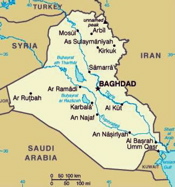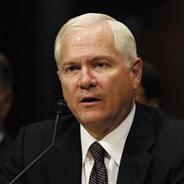I mentioned yesterday that Turkish withdrawal from Iraqi Kurdistan might be as blurry as what’s actually going on in the Qandil Mountains. Here’s what the Turkish general staff thinks it will look like: The Turkish Armed Forces (TSK) will create temporary security bases in northern Iraq after troops wrap up an ongoing ground offensive in the region against the outlawed Kurdistan Workers’ Party (PKK), security sources told Today’s Zaman. The army plans to establish 11 temporary bases south of the border with Iraq to prevent the PKK ever again using this territory to launch attacks on Turkey, after pulling out […]
Iraq Archive
Free Newsletter
In comments over at Headline Junky, reader GS flagged this sentence from Sam Brannen’s WPR piece about the Surge: “The United States is now the thread that binds Iraq, and it is clear that a serious unraveling of the situation would occur were this thread suddenly to be pulled away.” GS wondered: If this be the case, we are in a situation from which there is no exit. Does this make McCain right for saying he’d stay there for another hundred years? Does it make Obama wrong for saying we need to remove ourselves ASAP (and who knows what ASAP […]

Last week, the U.S.-led Multi-National Force-Iraq (MNF-I) had nothing but praise for Shiite theocrat-wannabe Moqtada al-Sadr. Prefacing his name with “al-Sayyid” (the Honorable), the United States acknowledged al-Sadr’s legitimacy in the Iraqi political scene as U.S. commanders warmly embraced his decision to maintain a ceasefire between his roughly 60,000-strong illegal militia (Jaish al-Mahdi or JAM) and Iraqi government and coalition forces. With a tenuous domestic political situation in Iraq, the United States had no choice but to shake hands with the devil. Without question, the short-term effects of the U.S. surge strategy have been highly positive: significant reductions of violence […]
I’ve got a hunch that we’re on the cusp of a popular Surge backlash, more widespread than what critics have suggested for the past few months. And when it does gather force, it will probably sound pretty much like what Sam Brannen, of the CSIS, says here. It’s already clear that the improved security environment in Iraq has not led to increased Iraqi investment in the political process in Baghdad. Brannen points out, though, what I’ve yet to see mentioned, namely that it has instead led to increased American investment in the political process in Baghdad. Increasingly, the United States […]
Kevin Drum and Matthew Yglesias speculate about what the Turkish incursion into Iraqi Kurdistan means for the central government in Baghdad. Matthew argues that American approval of the incursion demonstrates once again Baghdad’s de facto powerlessness, thereby reinforcing its dependence on American military support. Kevin wonders if the central government in Baghdad actually has a dog in this fight: As near as I can tell, the central government in Iraq doesn’t actually care all that much about the Turkish incursion. They object in a pro forma way, of course, but that’s about it. Iraqi Kurdistan has been de facto independent […]
I mentioned that I spoke with a well-informed European official about the IAEA’s Iran report. On a hunch, I asked him what kind ofstrategic impact Turkey — whichhas really stayed on the sidelines of this issue — could make byactively siding with the West’s position. Without hesitation he saidit would make a huge difference. In addition to the obvious reasons(Islamic country, regional power, etc.), he explained that Turkey isone of the countries in the region he would be most worried aboutseeking a nuclear weapons capacity should Iran aquire a nuclear bomb.Although he did not explicitly connect the dots, I interpreted […]
Once you get past all the speculation about how far into Iraqi territory Turkish forces intend to go (all the way to Qandil, 65 miles in?) and how long they’ll stay (permanent FOB’s to create a buffer zone?), this piece in Today’s Zaman is revealing for what it says about how Turkish analysts are interpreting the significance of the incursion. In a nutshell, they claim that it signals the isolation of Massoud Barzani and the end, for the time being, of Kurdish aspirations for a nation-state. The tell here is the advance American approval of the incursion, which amounts to […]
Following up some more on Richard Weitz’ article on the Army’s new stability and reconstruction doctrine, Small Wars Journal points to this link for an academic review of the Provincial Reconstruction Teams operating in Iraq and Afghanistan. The authors studied the PRT model all the way down the line, from the countries of origin to in-theater operations, and came up with a mixed bag, predominantly favorable to the missions, but full of interesting and thought-provoking stuff. I’m going through it now and cherrypicking the highlights: Domestic political constraints and priorities in the capitals of PRT-contributing countries are often directly translated […]

The U.S. Army is slated to publish a new operations manual this month that equates achieving success in stability operations with winning offensive and defensive battles. The new Army manual is in line with Secretary of Defense Robert Gates’ vision for military transformation. In a speech delivered last November at Kansas State University, Secretary Gates stressed the need to balance military force with political and economic resources in order to “integrate and apply all of the elements of national power to problems and challenges abroad.” Gates added that the experience of recent years, as well as his decades of public […]
A couple items that caught my eye from the Turkish press this morning. First, if you’re wondering why Turkey would send ground troops into the Qandil Mountains despite receiving actionable American intelligence for its aerial campaign, here’s one reason: The Zap and Avasin camps had been subject to aerial attacks since Dec. 16 but many hideouts there remained unharmed after the aerial strikes because the camps are located in a deep valley. I’ll offer two more, although they’re admittedly speculation. The PKK traditionally launches its attacks in the spring, when the mountain passes into Turkey have thawed. By pre-emptively scattering […]
There are conflicting reports about just how many troops Turkey has sent into northern Iraq, with the general trend being bearish. Initial Turkish TV reports (passed on by the press) put the number at 10,000, citing unnamed military sources. Reuters put the number at 8,000, or two Turkish brigades. Later television reports lowered it further to 3,000, which the Iraqi government today bid down to 1,000, only to be undersold by the American military command in Iraq which claimed that only a few hundred Turkish troops took part. The Turkish military, meanwhile, closed the bidding by warning that “media reports […]
A few days ago, Turkish FM Ali Babacan reiterated that Turkey still reserved the option of cross-border incursions into northern Iraq, weather permitting, to complement the artillery and bombing campaign they’ve been using to target PKK rebel camps in the Qandil Mountains. I figured the remarks were geared towards preparing public opinion for a spring offensive, since the winter weather in the Qandil Mountains is not very conducive to ground operations. But this morning come reports that the Turkish Army just sent 10,000 ground forces into northern Iraq following an artillery and air barrage. According to Hurriyet (Turkey), the U.S. […]

The neighborhood militias that are the lynchpin of the U.S. counterinsurgency strategy in Iraq have a new name, but the problems these groups present are as old as the Iraq war. In recent weeks, the U.S. military has begun calling the groups by the patriotic moniker “Sons of Iraq,” which Baghdad proposed to replace the difficult-to-translate “Concerned Local Citizens.” But the re-branding has done nothing to resolve the poor vetting, sectarian divisions and murky motives that make the groups a potential security risk in coming years. Three years after Iraq’s Sunni minority mostly boycotted national elections, the Sunni-dominated Sons of […]
Patrick Barry over at Democracy Arsenal gives some reasons why we should take Moqtada al-Sadr’s threats to end his ceasefire seriously in their own right, and not just in the context of our strategically over-leveraged position in Iraq: Anxieties are growing that Sadr will shirk calls to stay passive and US forces are pleading with him to keep his militias at bay. And who can blame them? Violence levels, especially in Sadr’s strongholds around Baghdad, have declined steeply since he demanded that his followers temporarily lay down arms. The prospect of a reinvigorated Sadrist militia roaming the streets looms fearfully […]
It looks like Moqtada al-Sadr, or one of his proxies, is threatening to call off his ceasefire again. Normally I don’t pay much attention to this regularly recurring story. But this time it reminded me of this recent AP report about a Sunni Awakening Council that had protested an alleged strafing incident by halting its cooperation with the American military. Neither story alone seems very significant, and together they still don’t add up to much. But they triggered a line of thought that goes something like this: We’ve reached a point in Iraq where everyone has accepted the limits of […]
